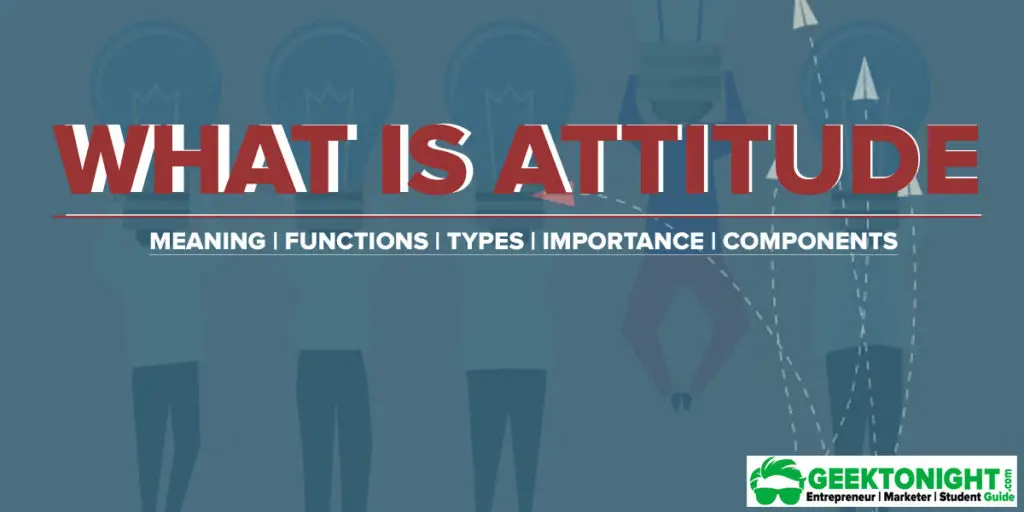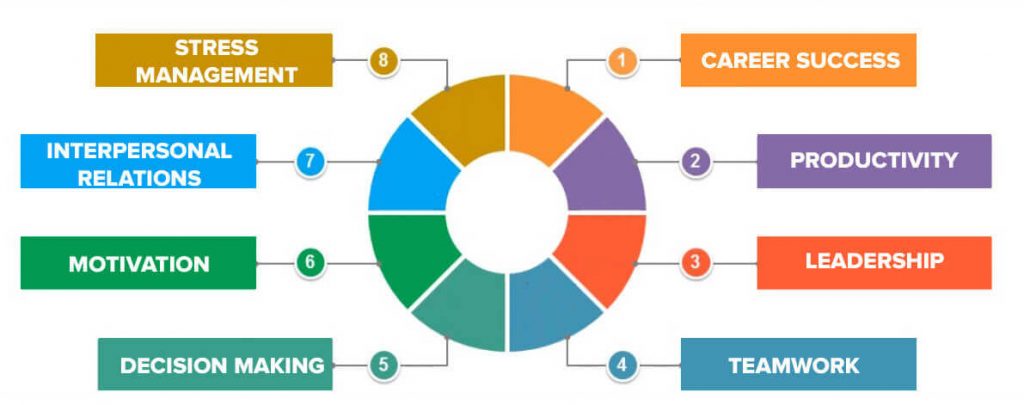Attitude is defined as a more or less stable set of predispositions of opinion, interest or purpose involving expectancy of a certain kind of experience and readiness with an appropriate response.
Attitudes are also known as “frames of reference“. They provide the background against which facts and events are viewed.
Table of Content
- 1 What is Attitude?
- 2 Attitude Definition
- 3 Attitude Meaning
- 4 Components of Attitude
- 4.1 Cognitive component
- 4.2 Affective component
- 4.3 Behavioral component
- 5 Characteristics of Attitude
- 5.1 Attitude are predispositions
- 5.2 Attitude are different from values
- 5.3 Attitude are evaluative statement
- 5.4 Attitude influence human behavior
- 5.5 Attitude have intensity
- 5.6 Attitude are learnt
- 6 Functions of Attitude
- 6.1 Adjustment Function
- 6.2 Ego-Defensive Function
- 6.3 Value-Expressive Function
- 6.4 Knowledge Function
- 7 Types of Attitude
- 7.1 Job satisfaction
- 7.2 Job involvement
- 7.3 Organizational commitment
- 8 Attitude Formation
- 8.1 Experiences
- 8.2 Perceptual biases
- 8.3 Observation of other person attitude
- 8.4 Association
- 8.5 Personality
- 9 Consumer Attitude Formation
- 10 Importance of Attitude
- 10.1 Career success
- 10.2 Productivity
- 10.3 Leadership
- 10.4 Teamwork
- 10.5 Decision making
- 10.6 Motivation
- 10.7 Interpersonal relations
- 10.8 Stress management
- 11 Theories of Attitude
- 11.1 Balance Theory
- 11.2 Congruity Theory
- 11.3 Affective Cognitive Consistency Theory
- 11.4 Cognitive Dissonance Theory
An attitude describes persons’ enduring favorable or unfavorable cognitive evaluations, feelings, and action tendencies toward some object or idea. People have attitudes regarding almost everything such as religion, politics, cloth, music, food.
A person’s attitudes settle into a coherent pattern and to change one may require difficult adjustment in many others. Thus, a company would be well advised to fit its product into existing attitudes rather than to try changing people’s attitude.
Attitude can be defined as learnt predispositions to respond to an object or class of objects in a consistently favorable or unfavourable way.
Attitude Definition
Attitudes are evaluation statements either favourable or unfavourable or unfavourable concerning objects, people or events. They reflect how one feels about something.
Robbins
Attitude is a mental and neutral state of readiness organized through experience, exerting a directive or dynamic influence upon individual’s response to all objects and situations with which it is related.
G.W. Allport
Attitude as an enduring organization of motivational, emotional, perceptual and cognitive processes with respect to some aspect of the individual’s world.
Krech and Crutchfield
Attitude is a tendency or predisposition to evaluate an object or symbol of that object in a certain way.
Katz and Scotland
Attitude Meaning
In simple words, an “attitude” is an individual’s way of looking or an individual’s point of view at something.
To be more specific, an “attitude” may be defined as the mental state of an individual, which prepares him to react or make him behave in a particular pre-determined way. It is actually an acquired feeling.
Attitude is the mixture of beliefs and feelings that people
have about situations, specific ideas or other people.
Also Read: What is Organizational Behavior? | Organizational Behavior Definition
Components of Attitude
- Cognitive component
- Affective component
- Behavioral component
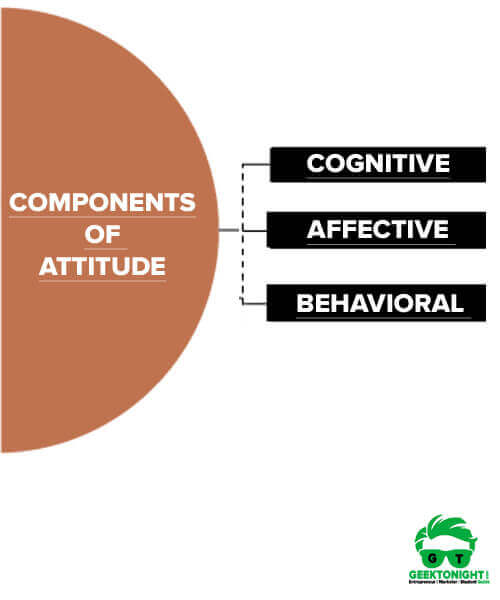
Cognitive component
Beliefs are the cognitive components of consumer attitude. Cognitive component of attitude is associated with the value statement. It consists of values, belief, ideas and other information that a person may have faith in.
Positive brand associations enhance brand equity and are achieved through a number of positioning strategies. Through brand associations, marketers establish and influence favorable beliefs about a brand and unfavorable beliefs about competitors.
Example: Quality of sincere hard is a faith or value statement that a manager may have.
Affective component
Affective is the emotive component of consumer attitude. Affective component of attitude is associated with individual feelings about another person, which may be positive, neutral or negative.
Three research models describe the determinants of affective response.
- Functional theory of attitude explains that consumers buy as a result of one of four psychological functions: adjustment, ego defense, value expression, and application of prior knowledge.
- Fishbein model relates consumer beliefs and evaluations to affective response: if beliefs are strong and desirable, affective responses are positive.
- Belief importance model analyses affective responses across competing brands.
Example: I don’t like Sam because he is not honest, or I like Sam because he is sincere. It is an expression of feelings about a person, object or a situation.
Behavioral component
Intention is the behavioral component of consumer attitude. Behavioral component of attitude is associated with the impact of various condition or situations that lead to person behavior based on cognitive and affective components.
Two research models demonstrate the relationship between intention to purchase and actual purchase and consumption.
- The theories of reasoned action explain purchasing behavior as a direct result of intention, influenced by attitude toward purchase and by subjective norms.
- The theory of trying to consume explains actual consumption behavior of purchasers. It provides insight into the establishment and maintenance of long-term relationship with consumers.
Example: I don’t like Sam because he is not honest is an affective component, I, therefore, would like to disassociate myself with him, is a behavioural component and therefore I would avoid Sam.
Cognitive and affective components are bases for such behaviour. Former two components cannot be seen, only the behaviour component can be seen. Former is important because it is a base for the formation of attitude.
Also Read: Vroom’s Expectancy Theory of Motivation
Characteristics of Attitude
Characteristics of attitude are discussed below:
- Attitude are predispositions
- Attitude are different from values
- Attitude are evaluative statement
- Attitude influence human behavior
- Attitude have intensity
- Attitude are learnt
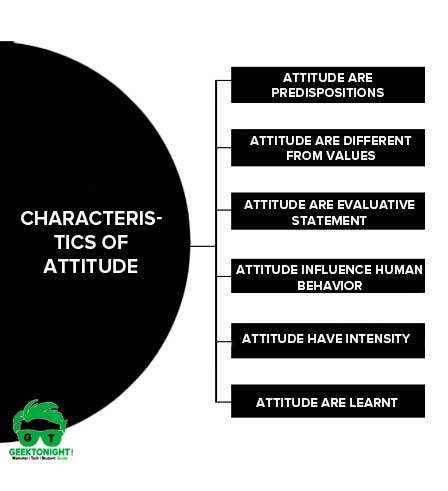
Attitude are predispositions
Attitude are predispositions of purpose, interest or opinion of the person to assess some objects in a favourable or an unfavourable manner.
Attitude are different from values
Attitude are different from values: Values are the ideals, whereas attitudes are narrow, they are our feelings.
Attitude are evaluative statement
Attitude are evaluative statements: either favourable or unfavourable concerning the objects, people or events.
Attitude influence human behavior
A positive attitude towards a thing will influence human behavior towards the thing favorably and vice-versa.
Attitude have intensity
It refers to the strength of the effective component. For example, we may dislike an individual but the extent of our disliking would determine the intensity of our attitude towards the person.
Attitude are learnt
Attitude is not inborn phenomenon. Attitude are learnt through social interaction and experience.
Functions of Attitude
Four important functions of attitude which are crucial in organizational behavior viewpoint are:
- Adjustment Function
- Ego-Defensive Function
- Value-Expressive Function
- Knowledge Function
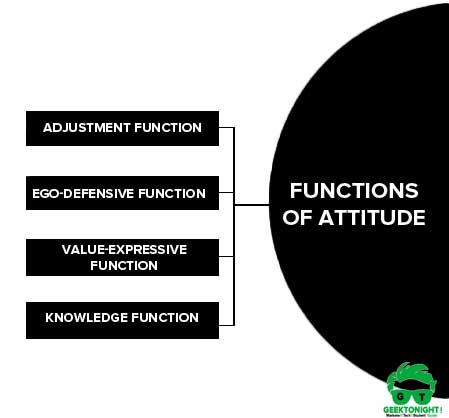
Adjustment Function
Attitudes often help individuals to adjust to their work environment.
Consumers hold certain brand attitudes partly because of the brand utility. If a product has helped us in the past even in a small way, our attitude towards it tends to be favorable. One way of changing attitude in favor of a product is by showing people that it can solve utilitarian goals. They may not have considered some advertisement which stresses the utilitarian benefits of a product.
Example: Well-treated employees tend to develop a positive attitude towards their management or job.
Ego-Defensive Function
Consumers want to protect their self concept from inner feelings of doubt. Cosmetic and personal hygiene products, by acknowledging this need, increase their relevance to the consumer and have the possibility of a favorable attitude by offering reassurance to the consumers self concept.
Example: Older faculty might feel somewhat threatened by a young and new faculty member who is full of fresh ideas and enthusiasm
Value-Expressive Function
Attitudes are one expression of general values, lifestyles, and outlook. If a consumer segment generally holds a positive attitude towards being in a fashion segment, consumer may treat high fashion clothing and accessories as symbols of that lifestyle.
Example, a manager who values honest and sincere work will be more vocal against an employee who is having a very casual approach towards work.
Knowledge Function
Attitudes provide frames of reference or standard that allow individuals to understand and perceive the world around him. Individuals have a strong need to know and understand the people and things with whom they come in contact, especially if they think they might influence their behavior.
Example, If a student has a strong negative attitude towards the college, whatever the college does, the student will be perceived as something ‘bad’ and as actually against them.
Also Read: What is Motivation? | Types of Motivation
Types of Attitude
There are broadly three types of attitude in term of organisational behavior
- Job satisfaction
- Job involvement
- Organizational commitment
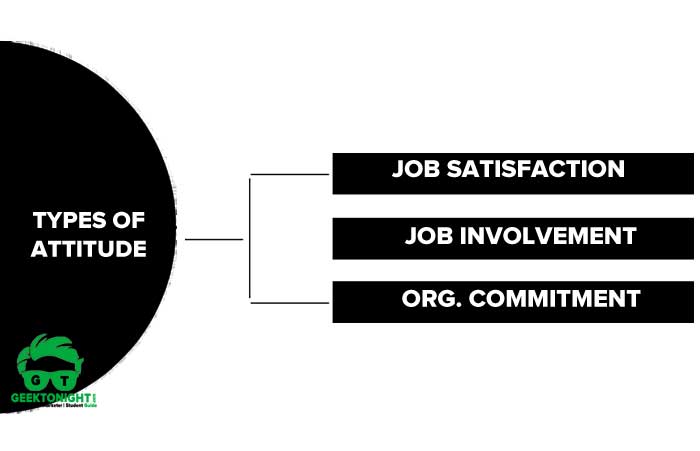
Job satisfaction
A collection of positive and/or negative feelings that an individual holds toward his or her job.
A person will hold a positive attitude if had a high level of satisfaction, while dissatisfied people will generally display a negative attitude towards life.
When we talk about attitude, we generally speak about job satisfaction because they are inter-related in organizational behaviour.
Job involvement
Job involvement refers to the degree to which a person identifies himself (psychologically) with his job, actively participates and considers his perceived performance level important to self-worth. (Robbins)
Higher job satisfaction leads to low absenteeism & employee turnover and indicates that the individual cares for his job.
Organizational commitment
Organizational commitment refers to a degree to which an employee identifies himself with the organizational goals and wishes to maintain membership in the organization.
Resigning from the job or absenting versus job satisfaction is a predictor of organizational commitment. Organizational commitment depends upon the degree of autonomy & freedom job and job enrichment factor.
Also Read: What is Perception? | Importance of Perception
Attitude Formation
The question often arises, ‘how are the attitudes and subsequent behaviors formed?’ While attitudes are basically learned over the years, some inherited characteristics do affect such attitudes
Some of the learned characteristics responsible for attitude formation are:
- Experiences
- Perceptual biases
- Observation of other person attitude
- Association
- Personality
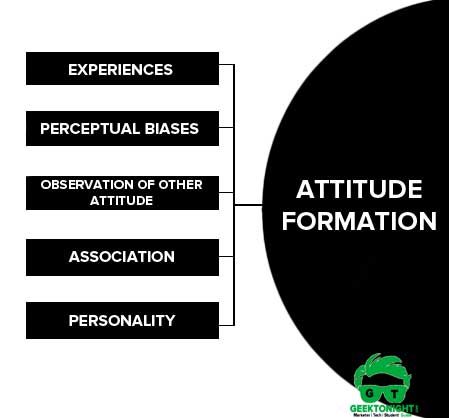
Experiences
Our personal experiences with people and situations develop our attitude towards such persons and situations.
Through job experience, people develop attitudes towards working conditions, salaries, supervision, group dynamics and so on.
Perceptual biases
Perception is the result of a complex interaction of various senses such as feelings, seeing, hearing and so on and plays an important part in our attitude and behavioural formation.
For example, if a manager perceives a subordinate’s ability as limited, he will give him limited responsibility. Similarly, we lose many good friends due to our changed perception about them.
Observation of other person attitude
When we like someone, we try to emulate that person’s attitude.
For example, when we are impressed by someone keeping calm under stressful circumstances and we appreciate such calmness, we might try to do the same.
Association
Our association with the group we belong to strongly influences our attitude. Our close association with a group would encourage us to be consistent with the attitude of the group.
Personality
Personality is a set of traits and characteristics, habit patterns and conditioned responses to certain stimuli that formulate the impression that a person makes upon others and this impression is a function of a person’s attitude.
Consumer Attitude Formation
Attitudes are learned though there are different approaches on how learning works as is acquired by individuals. Following factors lead to consumer attitude formation:
- Economic Factors
- Family Factors
- Social Factors
- Political Factors
- Psychological Factors
- Personality Factors
- Reference Group Factors
Read Complete Article: Consumer Attitude Formation
Importance of Attitude
An expert knows that a positive attitude is necessary for successful completion of a project or an assigned task. Having a positive attitude with positive thinking in the organization will reflect on what employee do and make them a more productive employee.
Importance of attitude in organisational behavior
Employees with a positive attitude will create a healthy atmosphere in the organization, develop positive relations with sub-ordinates, their supervisors, managers and top management. A positive attitude has significant benefits for an individual in many aspects.
Following are the aspects related to the importance of attitude:
- Career success
- Productivity
- Leadership
- Teamwork
- Decision making
- Motivation
- Interpersonal relations
- Stress management
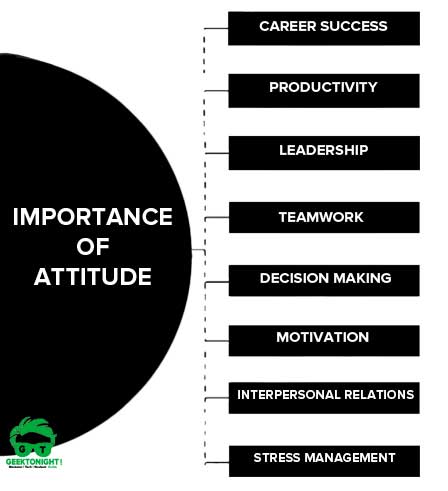
Career success
Performance is a parameter to measure employees‘ success in the workplace. Performance leads to success either through promotion or increased compensation. A positive attitude of an employee will help him to think of ways to accomplish their task in a well-defined manner
Productivity
An employee with a positive attitude tends to take more interest and responsibility and will provide better work, which in turn will improve productivity.
Leadership
Managing a diverse workforce is a crucial task for achieving the objective of an organization. Positive attitude demonstrated by leaders or employee will result in proper communication between the subordinate which will lead to efficient work.
Teamwork
A positive attitude of employees helps to appreciate each other‘s competencies and work as a team for achieving common objectives.
Decision making
An employee with a positive attitude and mindset will help employees to make better decisions, in an objective manner. It will enable employees to choose wisely and logically and avoid them to take an unambiguous decision.
Motivation
Motivation is an important factor for efficient work. An employee with a positive attitude will always be mentally prepared to face any obstacle in a job. The moment they are successful in overcoming obstacles, they are motivated to move forward.
Interpersonal relations
Customers prefer to make relation with someone who is positive in nature. A positive attitude helps in establishing valuable customer loyalty.
Stress management
Positive attitude and thinking will reduce the stress of an employee and with reduced stress employee can take a better decision and increase their productivity which results, employees, to enjoy better health and take fewer sick leaves.
Also Read: What is Learning? | Elements of Learning | Factors Affecting Learning
Theories of Attitude
- Balance Theory
- Congruity Theory
- Affective Cognitive Consistency Theory
- Cognitive Dissonance Theory
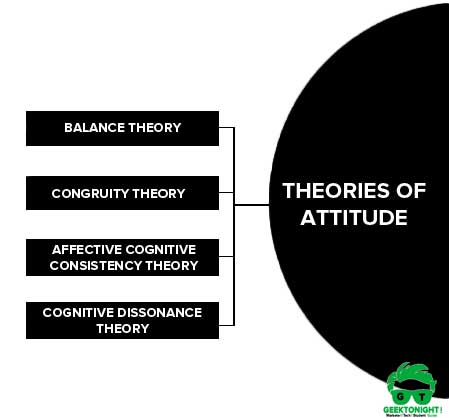
Lets discuss these 4 theories of attitude in brief:
Balance Theory
Balance Theory is concerned with consistency in the judgement of people and or issues that are linked by some form of relationship.
There are three elements:
- Person
- Other person
- Impersonal entity
There are two types of relationship to connect these three types of elements
- The linking relations or sentiments
- The unit relation
Both linking and unit relations are positive or negative towards any object or person or stimuli etc. or these three types of elements.
Congruity Theory
Congruity theory is similar to balance theory. The focus of the theory is on changes in evolution of a source and a concept that are linked by an associative or dissociative assertion.
Congruity exists when a source and concept positively associated have exactly the same evaluation, and when a source and concept that are negatively associated have exactly the opposite evaluation attached to him.
Affective Cognitive Consistency Theory
The theory is also called structural because it is concerned with what happens within the individual when an attitude changes.
It is concerned with the consistency between a person’s overall attitude towards an object or issue and its his beliefs about the relationship.
Cognitive structure means end relationship between the object or issue and the achievement of desired undesired values of goals.
Cognitive Dissonance Theory
It is little-bit similar to affective cognitive theory. The difference between these two is that the stimuli arise from environment in the first one.
This theory tends to tie in the third component of attitude. There are three types of cognitions: 1. Dissonance 2.
Go to Section:
What is Attitude? | Attitude Definition | Attitude Meaning | Components of Attitude | Characteristics of Attitudes | Functions of Attitude | Types of Attitude | Attitude Formation | Importance of Attitude | Theories of Attitude
Reference
- Robbins, Stephen P. 2010. Organizational Behaviour. New Delhi: Prentice-Hall.
- Anderson, M., 2004. The Power of Attitude, Thomas Nelson.
FAQ
What is Attitude?
Attitude is defined as a more or less stable set of predispositions of opinion, interest or purpose involving expectancy of a certain kind of experience and readiness with an appropriate response.
What is Personality?
Personality is the fundamental and foremost determinant of individual behaviour. It seeks to integrate the physiological and psychological facets of an individual to put them into action.
What is Perception?
Perception is the process by which a person interpret and organize sensation to produce a meaningful experience of the world.
What is Learning?
Learning can be defined as a relatively permanent change in behaviour or potential behaviour as a result of direct or indirect experience. Learning is thus a change in behaviour as a result of experience.
Go On, Share & Help your Friend
Did we miss something in Organizational Behavior Tutorial or You want something More? Come on! Tell us what you think about our post on What is Attitude? | Organisational Behavior in the comments section and Share this post with your friends.

These examples may contain rude words based on your search.
These examples may contain colloquial words based on your search.
Suggestions
That changed everything… climate, style, attitude.
Ведь тогда поменялось все: климат, образ жизни, отношение и т.д.
I believe that we can keep that attitude as adults too.
Я считаю, что мы можем сохранить это отношение и во взрослом возрасте.
Her attitude was shared by many we interviewed.
Ее позицию разделяли многие из тех, кого мы интервьюировали.
He developed a more political attitude from 1990.
«С 1990 года он в большей степени проявлял политическую позицию.
Any definition is controversial and already embodies a philosophic attitude.
Любое определение будет спорным и к тому же содержать в себе философский подход.
Know that people love you for your attitude and kindness, sometimes excessive.
Знайте, что люди любят вас за ваше отношение к ним и доброту, порой чрезмерную.
And she will not tolerate attitude below what it considers normal.
И она не потерпит к себе отношения ниже того, которое она считает нормальным.
But just as with other approaches, the attitude changes much less.
Но так же, как и в случаях других подходов, отношение меняется гораздо слабее.
This attitude arose after her former supervisor had humiliated her for years.
Это отношение возникло после того, как ее бывший руководитель в течение многих лет унижал ее.
Notice that this happens despite the previous bullish attitude in the price.
Обратите внимание на то, что это происходит, несмотря на предыдущее бычье отношение в цене.
That attitude would last long after the official celebrations were over.
Проявления этого подхода будут ощущаться еще в течение долгого периода после завершения официальных мероприятий.
You will feel very good attitude from other women.
Вы почувствуете очень хорошее отношение к себе со стороны других женщин.
I started thinking about my his attitude about weakness.
Я начал думать о своем отце… и о его отношении к слабости.
But this liberal attitude is really a way of earning money.
Но либеральное отношение — это не что иное, как способ заработать денег.
Well, your attitude changes pretty quickly when you start to lose your freedom.
Э.С.: Ну, ваше отношение довольно быстро изменится, когда вы начнете терять свою свободу.
Profits change your whole attitude, even if you start part-time.
Прибыль изменяет Ваше целое отношение, даже если Вы начинаете неполный рабочий день.
I hope you will change your attitude about the sacrament.
Я надеюсь, что этот игрок изменит своё отношение к «Шахтеру».
Multi-agency public awareness campaigns might challenge this attitude, which is addressed in the Riyadh Guidelines.
Проводимые различными учреждениями кампании по повышению осознания общественностью этой проблемы могут изменить подобное отношение, о котором говорится в Эр-Риядских руководящих принципах.
Suggestions that contain attitude
Results: 28386. Exact: 28386. Elapsed time: 204 ms.
Documents
Corporate solutions
Conjugation
Synonyms
Grammar Check
Help & about
Word index: 1-300, 301-600, 601-900
Expression index: 1-400, 401-800, 801-1200
Phrase index: 1-400, 401-800, 801-1200
One of the most popular topics people like to study, research and understand is about body language and mindset. What someone believes, how or what they are thinking, and what they do is of peak curiosity for people.
When we talk about the word attitude it can be a belief, a mindset or a state of mind, and these things can be seen in how someone presents themselves and the behavior they project. The word attitude is a noun and had a few different meanings depending on the context it is used in.
1. Meaning of Attitude:
We can use the word attitude to express what you think or perceive someone.
- My son has a great attitude towards school.
- My boss wants to change the attitude of the department so people enjoy coming to work.
2. Meaning of Attitude:
In terms of aviation, the word attitude can be used to describe the position of an aircraft.
- The aviation student had difficulty with understanding the concept of attitude, when flying a plane.
- You need to watch your attitude and pay attention to the ADI instruments.
3. Meaning of Attitude:
The word attitude can be used to express the way someone behaves as a result of how they think or see things.
- The new manager had an aggressive attitude towards the staff. I wonder how long he will last?
- I really like your new friend she is polite and has a optimistic attitude.
4. Meaning of Attitude:
When we talk about body language, people can express attitude based on how they arrange and position their body, extremities and facial expressions.
- Based on her hands on her hips, she was displaying an angry attitude.
- His eyes and shoulders expressed an attitude of sadness.
5. Meaning of Attitude:
When someone presents a negative, defiant, and arrogant manner they can be said to be giving attitude.
- I don’t know what your problem is, but cut the attitude or you will be grounded for another week!
- The new delivery boy has a lot of attitude and the boss told him to ship up or ship out.
Dialog:
Francis: Hey Paul, what’s with the attitude?
Paul: What are you talking about? I don’t have any attitude?
Francis: It is not what you are saying, your body speaks attitude so loudly I have to cover my eyes and ears!
Paul: Yeah, ok. I guess my attitude is a little bad lately. My boss has been giving me attitude, my girlfriend has been giving me attitude and even my dog has been giving me attitude.
Francis: Funny! Well you usually have a much better attitude about things, so I thought I would ask.
Paul: Yeah, I need to get back to my positive attitude and not let the attitudes of others affect me so much.
Related Phrases & Phrasal Verbs:
Point of view – we use point of view to say that someone has a belief of opinion about something or someone.
- Though his attitude, he made his point of view very clear.
Frame of mind – we use this phrase in the context of attitude, to express a mood or disposition.
- I am concerned about Sally’s attitude and here state of mind when it comes to working closely with her fellow co-workers.
Way of thinking – we use this phrase to express one’s opinion or belief about something.
- His way of thinking does not match the attitude of the rest of the group, he should be asked to step down as team leader.
Turn of mind – we use turn of mind to say that someone has a fixed and particular way of thinking.
- The CEO had a turn of mind because of the attitude of the consumers towards the manufacturing of the product in China
Cop an attitude – we use this phrase when we express that someone is arrogant or haughty.
- My girlfriend really coped an attitude when I told her I didn’t want to get married until I graduate from college.
Related idioms:
Mind trip/Head trip – in the context of attitude, we would use this to say that someone is on an ego trip or behaving in a selfish and arrogant way.
Modus aperandi – in the context of attitude, we use this phrase to describe a persons particular and stubborn way of doing something.
Back talk – This phrase is used to describe when someone is disrespect a person of authority with their words.
Wisecrack – in the context of attitude, we use this phrase to say that someone has criticizes someone in a negative and sarcastic way.
Two cents worth – we use this phrase in the context of attitude, to say that someone is giving an opinion that is unwanted or that is critical of something or someone.
Synonyms (other ways to say):
Mood
Feeling
Viewpoint
Demeanor
Temperament
Mood
Manner
Posture
Pose
Presence
-
1
attitude
attitude n
пространственное положение
attitude angle
угол пространственного расположения судна
attitude at impact
пространственное положение в момент удара
attitude control system
система ориентации
(в полете)
attitude director indicatorкомандный авиагоризонт
attitude display
индикатор пространственного положения
attitude flight control
управление пространственным положением
attitude gyroscope
гировертикаль
attitude hold
стабилизация пространственного положения
attitude indicator
указатель пространственного положения
attitude sensor
датчик пространственного положения
flare attitude
положение при выравнивании перед посадкой
high nose-up attitude
положение с высоко поднятой носовой частью фюзеляжа
level attitude
горизонтальное положение
pitch attitude
положение по тангажу
English-Russian aviation dictionary > attitude
-
2
attitude
1) пози́ция; отноше́ние (к чему-л.);
friendly attitude towards smb. дру́жеское отноше́ние к кому́-л.
2) по́за; оса́нка
3):
4)
ав.
положе́ние самолёта в во́здухе
Англо-русский словарь Мюллера > attitude
-
3
attitude
English-Russian dictionary of biology and biotechnology > attitude
-
4
attitude
Персональный Сократ > attitude
-
5
attitude
угловое пространственное положение; угловая ориентация ; ав угол тангажа
Englsh-Russian aviation and space dictionary > attitude
-
6
attitude
угловое (пространственное) положение, ориентация ; угол, характеризующий положение; угол тангажа
aircraft attitude
approach attitude
bank attitude
climb attitude
climb-out attitude
descent attitude
ejection attitude
firing attitude
flat attitude
flight attitude
flight path attitude
flying attitude
high-angle-of-attack attitude
high-drag attitude
impact attitude
lateral attitude
left wing low attitude
level attitude
longitudinal attitude
nose-high attitude
nose-low attitude
nose-up attitude
peak-to-peak pitch attitude
pitch attitude
pre-stall attitude
recovery attitude
right wing low attitude
roll attitude
stick-shake attitude
stick-shaker attitude
supernormal attitude
tail-down attitude
touchdown attitude
transient attitude
trimmed bank attitude
upright attitude
vehicle attitude
wing-level attitude
wing-low attitude
yaw attitude
Авиасловарь > attitude
-
7
attitude
Politics english-russian dictionary > attitude
-
8
attitude
ˈætɪtju:d сущ.
1) позиция;
отношение к чему-л. (about;
of;
to, towards) to assume (strike, take) an attitude ≈ занять определенную позицию по отношению к чему-л. belligerent (defiant, surly) attitude ≈ воинственное отношение к кому-л., агрессивное отношение к кому-л. casual attitude ≈ небрежное отношение cavalier (condescending, patronizing) attitude ≈ покровительственное отношение (к кому-л.), снисходительное отношение (к кому-л.) holier-than-thou attitude ≈ лицемерное отношение к кому-л. или к чему-л. irreverent attitude ≈ непочтительное отношение liberal attitude ≈ либеральная позиция negative attitude ≈ отрицательная позиция по отношению к чему-л. positive attitude ≈ положительное отношение к чему-л. reverent attitude ≈ благоговейное отношение scornful attitude ≈ презрительное отношение to assume an attitude of defiance towards all authority ≈ презрительно относиться к авторитетам I didn’t like his attitude that he deserves special treatment. ≈ Мне не нравится его позиция, что он заслуживает особого отношения. friendly attitude towards smb. ≈ дружеское отношение к кому-л. attitude of mind ≈ склад ума Syn: stand
2) поза;
осанка defence attitude ≈ защитное положение, принимаемое больным для уменьшения боли
3) авиац. положение самолета в воздухепозиция, отношение — friendly * towards smb. дружеское отношение к кому-л. — to adopt an intransigent * over smth. занять непреклонную позицию по отношению к чему-л. — * of mind склад ума — what’s your * towards this question? как вы относитесь к этому вопросу? положение, поза, осанка — hesitating * нерешительная поза — * of pride гордая поза — * of admiration поза, выражающая восхищение — to assume /to adopt/ the * of a boxer ready to fight принять стойку боксера, приготовившегося к бою (искусство) поза аттитюд (в классическом балете) (специальное) (пространное) положение (психологическое) социальная установка (геология) залегание > to strike an * (неодобрительно) встать в позу, упереться;
принять эффектную /театральную/ позу > he is always striking a pious * он всегда старается выставить напоказ свою набожностьattitude взгляд ~ отношение ~ поза;
осанка ~ позиция, отношение ~ позиция;
отношение (к чему-л.) ;
friendly attitude towards (smb.) дружеское отношение (к кому-л.) ~ позиция ~ положение, поза, осанка ~ положение ~ ав. положение самолета в воздухеbrand ~ отношение к торговой марке
~ позиция;
отношение (к чему-л.) ;
friendly attitude towards (smb.) дружеское отношение (к кому-л.)Большой англо-русский и русско-английский словарь > attitude
-
9
attitude
1. n позиция, отношение
2. n положение, поза, осанка
3. n иск. поза
4. n аттитюд
5. n психол. социальная установка
6. n геол. залегание
Синонимический ряд:
1. disposition (noun) approach; bearing; demeanor; demeanour; disposition; feeling; manner; sensibility; sentiment; spirit; temperament
2. perspective (noun) carriage; color; opinion; outlook; perspective; point of view; pose; position; positure; posture; stance; stand; standpoint; viewpoint
English-Russian base dictionary > attitude
-
10
attitude
[‘ætɪt(j)uːd]
сущ.
1) позиция; отношение
belligerent / defiant / surly attitude — воинственное, агрессивное отношение
cavalier / condescending / patronizing attitude — покровительственное, снисходительное отношение
to assume / strike / take an attitude — занять определенную позицию
I didn’t like his attitude that he deserves special treatment. — Мне не понравилась его позиция, что он заслуживает особого отношения.
He has always assumed an attitude of defiance towards all authority. — Он всегда презрительно относился ко всем авторитетам.
Syn:
2) поза; положение
3)
авиа
положение самолёта в воздухе
••
Англо-русский современный словарь > attitude
-
11
attitude
[ˈætɪtju:d]
attitude взгляд attitude отношение attitude поза; осанка attitude позиция, отношение attitude позиция; отношение (к чему-л.); friendly attitude towards (smb.) дружеское отношение (к кому-л.) attitude позиция attitude положение, поза, осанка attitude положение attitude ав. положение самолета в воздухе attitude of mind склад ума brand attitude отношение к торговой марке change one’s attitude изменять свое отношение consumers’ attitude позиция потребителей attitude позиция; отношение (к чему-л.); friendly attitude towards (smb.) дружеское отношение (к кому-л.)
English-Russian short dictionary > attitude
-
12
attitude
[ʹætıtju:d]
1. позиция, отношение
friendly [impartial] attitude towards smb. — дружеское [беспристрастное] отношение к кому-л.
to adopt an intransigent attitude over smth. — занять непреклонную позицию по отношению к чему-л.
what’s your attitude towards this question? — как вы относитесь к этому вопросу?
2. 1) положение, поза, осанка
hesitating [melancholy] attitude — нерешительная [задумчивая] поза
attitude of pride [arrogance] — гордая [надменная] поза
attitude of admiration [despair] — поза, выражающая восхищение [отчаяние]
to assume /to adopt/ the attitude of a boxer ready to fight — принять стойку боксёра, приготовившегося к бою
3.
(пространное) положение
to strike an attitude — а) встать в позу, упереться; б) принять эффектную /театральную/ позу
he is always striking a pious attitude — он всегда старается выставить напоказ свою набожность
НБАРС > attitude
-
13
attitude
позиция, отношение; угловое пространственное положение; угловая ориентация
— launching attitude
English-Russian military dictionary > attitude
-
14
attitude
n
позиция, отношение; взгляд
— show one’s attitude to smth.
English-russian dctionary of diplomacy > attitude
-
15
attitude
сущ.
1)
общ.
отношение, позиция
positive [negative] attitude — положительное [отрицательное] отношение
to assume [strike, take] an attitude towards smth — занять определенную позицию по отношению к чему-л.
See:
2)
псих.
аттитюд, установка
«Mental attitude toward winning and losing is key,» explained successful football coach Don Shula.Your attitude makes all the difference.» — Главное — быть готовым к победе и поражению», — объяснил преуспевающий футбольный тренер Дон Шула— «Ваша установка имеет главное значение».
See:
Англо-русский экономический словарь > attitude
-
16
attitude
Англо-русский технический словарь > attitude
-
17
attitude
Англо-русский синонимический словарь > attitude
-
18
attitude
English-russian dctionary of contemporary Economics > attitude
-
19
attitude
English-Russian big polytechnic dictionary > attitude
-
20
attitude
English-Russian big medical dictionary > attitude
Страницы
- Следующая →
- 1
- 2
- 3
- 4
- 5
- 6
- 7
См. также в других словарях:
-
ATTITUDE — Le mot attitude vient du latin aptitudo. Son sens primitif appartient au domaine de la plastique: «Manière de tenir le corps. [Avoir] de belles attitudes», dit Littré. Du physique le terme se transpose au moral: «L’attitude du respect»; puis il… … Encyclopédie Universelle
-
Attitude — may refer to: NOTOC Psychology* Attitude (psychology), a person s perspective toward a specified target * Propositional attitude, a relational mental state connecting a person to a propositionMusic* Attitude (rapper) * Attitudes (band), a 1970s… … Wikipedia
-
Attitude — At ti*tude, n. [It. attitudine, LL. aptitudo, fr. L. aptus suited, fitted: cf. F. attitude. Cf. {Aptitude}.] 1. (Paint. & Sculp.) The posture, action, or disposition of a figure or a statue. [1913 Webster] 2. The posture or position of a person… … The Collaborative International Dictionary of English
-
attitude — ATTITUDE. s. f. Situation, position du corps. Belle attitude. Toutes les attitudes de ce tableau sont admirables. Mettre un modèle dans une certaine attitude. Le peindre dans une certaine attitude. Son attitude étoit à peindre. [b]f♛/b] On donne… … Dictionnaire de l’Académie Française 1798
-
attitude — One might say that this is now a word with attitude, in its 20c meaning ‘aggressive or uncooperative behaviour’, which represents a special application of one kind of characteristic attitude (in the established meaning ‘a person s settled opinion … Modern English usage
-
Attitüde — (sprich ˌatiˈtyːdə; von französisch attitude, gesprochen atityd, Haltung, Verhalten, Gebaren, Einstellung) nennt man in der Kunst die Haltung, Stellung oder Lage menschlicher Figuren, eine Positur oder eine Gebärde. Im Sinne der bildenden Kunst… … Deutsch Wikipedia
-
attitude — [at′ə to͞od΄, at′ətyo͞od΄] n. [Fr < It attitudine, attitude, aptness < LL aptitudo (gen. aptitudinis) < L aptus, APT1] 1. the position or posture assumed by the body in connection with an action, feeling, mood, etc. [to kneel in an… … English World dictionary
-
attitude — UK US /ˈætɪtjuːd/ noun [C or U] ► a feeling or opinion about something, especially when this shows in your behaviour: attitude towards sb/sth »We need team players with a positive attitude towards work. »What is your employer s attitude to equal… … Financial and business terms
-
Attitüde — Sf Haltung , besonders affektierte Haltung, Einstellung erw. fremd. Erkennbar fremd (18. Jh.) Entlehnung. Entlehnt aus frz. attitude f., das seinerseits aus it. attitudine entlehnt ist. Dessen weitere Herkunft ist mehrdeutig (zu l. aptus passend… … Etymologisches Wörterbuch der deutschen sprache
-
Attitude — ist der Name: eines Album der norwegischen Band Susperia, siehe Attitude (Album) einer britischen Zeitschrift, siehe Attitude (Zeitschrift) Diese Seite ist eine Begriffsklärung zur Unterscheidung meh … Deutsch Wikipedia
-
Attitüde — Attitüde, Stellung des Leibes, Lage, Haltung, vorzüglich in der Ruhe. Die Attitüde fordert beim bildenden Künstler, beim Tänzer, beim Pantomimen und Schauspieler große Vorstudien, denn sie sei der jedesmalige genaue Abdruck des Seelenzustandes… … Damen Conversations Lexikon
Sports writers are even more left wing than political journalists, so viewing their political opinions as somehow signifying a popular shift in attitude is a mistake. ❋ Unknown (2007)
On the Sunday morning news shows, massive change in attitude from the Dems. ❋ Unknown (2006)
One of the major reasons for this change in attitude is that there’s more money around. ❋ Unknown (2003)
For some, it is an easy shorthand for a change in attitude from the search for growth — which largely meant industrial and material growth — toward a society whose values are less materialistic and more concerned with the quality of life and the environment. ❋ Unknown (1984)
Thomas was the first to make fruitful use of the term attitude, which he defined as a «tendency to act.» ❋ Robert Ezra Park (1926)
What they miss out on with this attitude is the joy that results from the effort. ❋ Unknown (2009)
He contrasts this with «destructively arrogant,» which he defines as an attitude that lacks empathy and reeks of insolence and vanity. ❋ M.D. Richard C. Senelick (2012)
And one other thing while I am at it, Sir, your attitude is the exact reason I left Ohio to return the Chattanooga after 2 years. ❋ Unknown (2009)
This attitude is accepted by all the others; forsooth, he is indeed a great man and master. ❋ Unknown (2010)
I think this attitude is an immense barrier to entry. ❋ Unknown (2009)
I think this attitude is the problem, and not economics or some union. ❋ Unknown (2010)
Yes, I love myself; and yes, my attitude is a notch or two above [email protected]#$%!. ❋ Unknown (2009)
But this attitude is the very opposite of what feminist is supposed to be about. ❋ Unknown (2009)
This attitude is all the more pronounced in those who hold leadership positions in the gay rights movement, as their life’s work depends upon the notion that we are always and everywhere oppressed. ❋ Unknown (2009)
Among West Indian and African families here in the US the attitude is the same. ❋ Unknown (2008)
Seriously their attitude is the selfsame thing as led to residential schools. ❋ Unknown (2008)
To be honest, Steve, your attitude is an emotional response which is not too unlike the unthinking emotional reactions of most criminals on July 24, 2008 at 3: 31 pm | Reply bobby ❋ Inspector Gadget (2008)
This attitude is the one that separates all of us daily regardless of whether it is an election year. ❋ Unknown (2008)
[parent]: «[how was your day] [billy]?»
billy «it was fin-»
parent «iS tHaT AtTiTudE i HeaR?!?» ❋ Deathisinnevitable (2019)
[Stood] in a [graceful] attitude ❋ Rishabh (2005)
[Jill] [sometimes] have an [attitude problem]. ❋ Gerard Irick (2009)
No one likes either [Sue] or her husband George, its because of their attitude. She walks in the room with her [sun] glasses and you could tell she had a [snotty] attitude. ❋ M.A (2006)
Jerry: Man, I will never be able to find a good job!
Paul: [Not with that attitude], you won’t!
Lisa: I’ll never get John to give me a [Las Vegas Chainsaw]!
[Jennifer]: Not with that attitude! ❋ Unkle_ruckus (2010)
[I don’t] have an [attitude problem] , It’s just that you can’t [handle] my personality ❋ Ba Baji (2014)
That [hoochie] is so attitudal…
[Carly]: She’s such a [skankrow]
Amanda: Girl, you’re so attitudal ❋ HoochieGirl (2005)
Attitude!
[It’s all] about the attitude, I don’t care if we win or [lose it’s] ALL ABOUT THE ATTITUDE!
If you want to play with the ball, go to soccer, this is football, again [it’s all] about the attitude! ❋ FRESHMAN FB 08 (2008)
Bitches with no [titties] be having the worst [attitude] [like damn] thought you got everything off your chest ❋ Janae Mcdan (2022)
[Parent]: Why you always got a attitude with me
Any kid:[Bc] you always starting [some bullshit] ❋ JBCTKC (2018)

